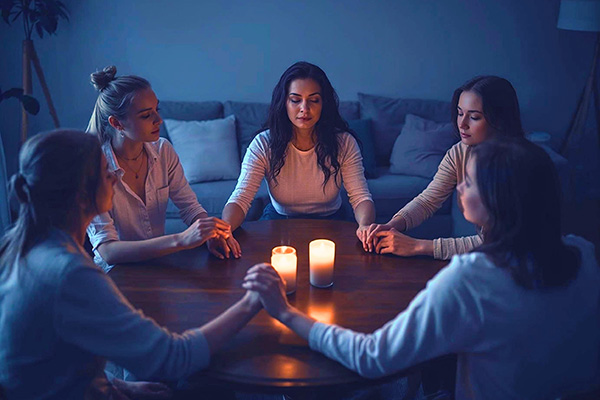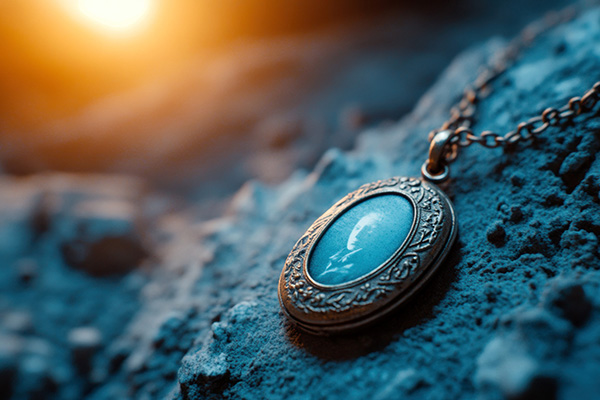spiritual traditions
Be The Light That Darkness Cannot Touch
 The nightmare continues every day. The very thing we fear the most has come to look us right in the face, staring in our eyes. This little imp taps us on the shoulder, reminding us of all the stupid things we did, all the hurtful things, how we messed up, time after time.
The nightmare continues every day. The very thing we fear the most has come to look us right in the face, staring in our eyes. This little imp taps us on the shoulder, reminding us of all the stupid things we did, all the hurtful things, how we messed up, time after time.
We messed up time again, no one agrees with us, we are reminded that “they” are so much smarter, did things exactly right every time.
We are at a turning point. We can give up, turn, run for the hills to hide, but still there is the demon of fear lingering around the deep recesses of our mind.
Surely this little devil of fear tells us we can see how we don’t deserve to reach our dreams, or accomplish our goals.
Stand back! Truly look at everything from all sides. Become like an eagle, or an owl, or a hawk, with eyes that see far beyond the surface where the heart lies.
Try to be kind and loving. Put your mind in the thoughts of being kind, being positive, no matter how much doing so lays open our heart for others to stomp on, even though many others will think you have lost your mind.
When we try with all our hearts to do something toward our dream, with love, with pure knowledge, we are listening to spirit. Then we gain strength, we gain courage, we pass over the top of the highest mountain to reach the other side. Let this outlook enlighten your heart, mind and soul toward a new attitude, for a new beginning.
The Timeless Magic Of Nature Spirits And Elementals
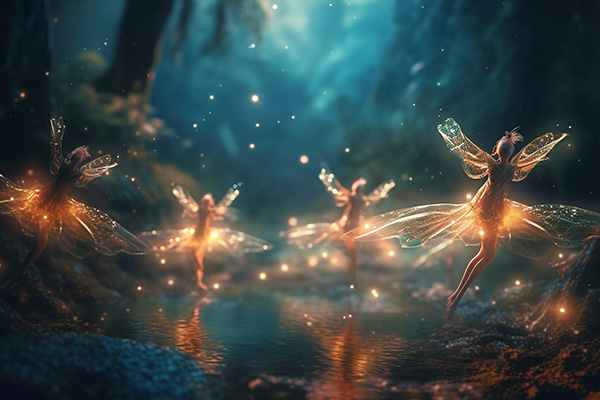 As a youngster growing up in the UK, I loved visiting a neighbor, Mrs. O’Leary, whose lilting Irish voice still echoes in my mind. She spoke often of the “Good People” and acknowledged their presence in her home and garden. I recall her taking us outside to witness her making small offerings to these unseen little mystical beings.
As a youngster growing up in the UK, I loved visiting a neighbor, Mrs. O’Leary, whose lilting Irish voice still echoes in my mind. She spoke often of the “Good People” and acknowledged their presence in her home and garden. I recall her taking us outside to witness her making small offerings to these unseen little mystical beings.
Though it feels like a distant memory now, I can still recall seeing them, too. Perhaps they appeared to us because we truly believed, or perhaps because Mrs. O’Leary invited them to show themselves.
Whatever the reason, those moments left a lasting impression. To me, it felt like truly being “in my element,” fully connected to the hidden, magical forces of nature.
I vaguely recall a magical moment in Mrs. O’Leary’s garden when she pointed out to me a tiny, translucent little figure perched on a large moss-covered rock at the base of her prized old hawthorn tree. With delight, she described how this “little person” was waving at us and encouraged me to wave back. Standing there with awe and intrigue, I became aware of what seemed like hundreds of luminous sprites dancing in the glistening water below.
Despite all the cynicism of a technologically driven world, increasingly devoid of the many miracles and wonders of nature and the unseen realms, Mrs. O’Leary and the spirits of nature still remind me of the healing, transformative power that lies in reverence, stillness, and everyday magic.
The Mysteries, Messages And Magic Of Meteorites
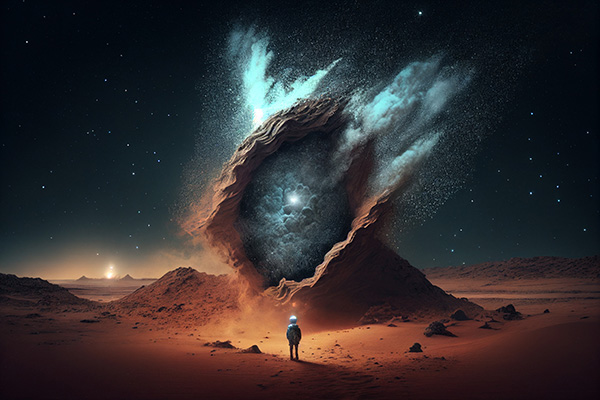 Meteorites have long intrigued me as one of the great mysteries of the universe. They’ve fascinated me for years, not only because they survive their fiery descent through Earth’s atmosphere in such an epic and awe-inspiring way, but also because of their extraordinary origins.
Meteorites have long intrigued me as one of the great mysteries of the universe. They’ve fascinated me for years, not only because they survive their fiery descent through Earth’s atmosphere in such an epic and awe-inspiring way, but also because of their extraordinary origins.
Recently, I acquired a small piece of meteorite from Campo del Cielo, a renowned celestial fragment discovered by Spanish explorers in Argentina in 1576. It now graces my altar with it cosmic presence, enhancing the energy of my home and sparking some fun conversations!
Their origins are diverse. Some come from asteroids or comets, others from planetary bodies.
However, what I find especially captivating about these “messengers from space” is that they offer more than just scientific insights into the birth of our solar system.
Even more compelling is the spiritual and esoteric significance they’ve held throughout human history. Across time and tradition, they continue to be revered as powerful allies in spirituality and metaphysics.
Many lithotherapy practitioners believe meteorites are gifts from the divine, reminding us of our eternal connection to the cosmos. They are symbols of spiritual awakening, transformation, and divine wisdom.
Ancient civilizations used them for meditation and healing, to connect with higher realms, and to catalyze personal growth. Because they are quite literally “otherworldly,” meteorites offer us a cosmic perspective and invite us to reflect on our place within the grand tapestry of existence.
A Mystic’s Guide To The Final Months Of 2025
 As we move into the final months of 2025, the energy around us feels less like things are quietly wrapping up and more like they are building toward a big, undeniable turning point.
As we move into the final months of 2025, the energy around us feels less like things are quietly wrapping up and more like they are building toward a big, undeniable turning point.
This is not just the year slowly running out of days. It is a season where the universe seems to be leaning in close, asking us to pay attention. There is a sense that something important is in motion, even if we cannot see all the pieces yet.
These last months carry a certain electricity in the air, a quiet pressure that says, “Something is shifting. Are you ready?” But it’s not about pushing harder or doing more. It is about listening more deeply, trusting more fully, and allowing the old ways to loosen their grip so we can step into what is next.
We are in a threshold season: that sacred in-between space where the old patterns no longer fit, but the new has not fully taken form. It can feel strange, even uncomfortable, like standing in a doorway, grasping one handle while peeking into another room, not quite ready to let go, yet knowing you cannot stay where you are.
You might notice a pull to slow down, choose your time and energy more wisely, or step back from noise and distraction. This is not you being unproductive; it is your inner compass reorienting. Your soul knows when it is time to listen within. Sometimes it whispers through restlessness, sometimes through a craving for solitude, sometimes through sudden clarity about what no longer feels right.
The Spiritual Power Of The Words You Speak
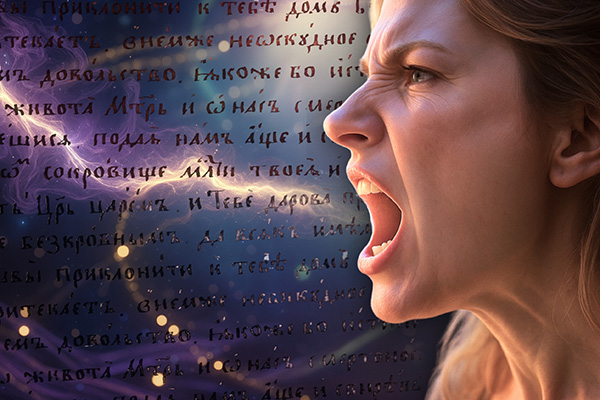 Have you ever stopped to truly consider the words you speak? Most of us talk all day, every day, without realizing the impact of each syllable we send out into the world.
Have you ever stopped to truly consider the words you speak? Most of us talk all day, every day, without realizing the impact of each syllable we send out into the world.
Words are much more than just communication sounds. They’re vibrations, frequencies, and intentions. Whether spoken softly, shouted out loud, or whispered quietly to yourself, every word carries mystical energy.
In many spiritual traditions, the spoken word is seen as a powerful metaphysical force or divine power. It is a force of creation and transformation.
From magical incantations to sacred ceremonies, words have long been used to shape everyday reality, influence the world and improve life.
The earliest recorded reference to the power of speech dates back to ancient Mesopotamia. In the city of Uruk, magical incantations were found carved onto clay tablets dating back to approximately the 5th century BCE. These spoken spells were used for protection, healing, and influencing others, revealing a deep understanding of the energetic and powerful nature of speech as early as 2,500 years ago.
Around the same time, the ancient Egyptians believed in the concept of heka, which is often translated today as “magic” but really means “divine creative power.” They believed the gods used heka to create the world, and that humans could access this same creative power through sacred words called hekau.
